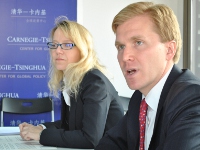Registration
You will receive an email confirming your registration.
IMGXYZ3492IMGZYXOn April 8, 2010, Russia and the United States signed the New Strategic Arms Reduction Treaty (New START), which limits both countries’ deployed strategic warheads to 1,550 and deployed strategic delivery systems to 700. Implementation of this treaty is seen a signal of U.S. and Russian commitment to Article VI of the Nuclear Nonproliferation Treaty. In the first installment of the Strategic Stability Seminar Series, Elbridge Colby, research analyst at the Center for Naval Analyses, offered his evaluation of the New START process and its impact on strategic stability. Carnegie’s Lora Saalman moderated.
Implementing New START
Russia and the United States ratified New START as a successor to START-I, which constituted the first significant, intrusive strategic arms control agreement, explained Colby. He argued the earlier Strategic Arms Limitation Treaties (SALT) were much less ambitious. Despite advances, Colby estimated that reductions under New START are relatively modest and further reductions face large obstacles:
- Ballistic Missile Defense: Colby detailed the limited formal discussion between the United States and Russia regarding U.S. plans for a Phased Adaptive Approach , which is a phased missile defense architecture featuring deployments of increasingly-capable sea- and land-based missile interceptors. He noted that Moscow remains suspicious about U.S. intent in including Europe into its broader ballistic missile defense network.
- Tactical Nuclear Weapons: Many in Washington are interested in constraining Russia’s tactical nuclear weapons, while at the same time Moscow wants U.S. tactical nuclear weapons removed from Europe, Colby said. Yet, given U.S. commitments to the North Atlantic Treaty Organization (NATO), he called this a “non-starter.”
- U.S. Domestic Politics: Arms control negotiations are not only between Washington and Moscow, but also bargains among U.S. interest groups, Colby argued. This dual reality will inform any future negotiations with Russia.
- Conventional Prompt Global Strike: Colby noted that Russia is interested in discussing U.S. conventional prompt global strike (CPGS) programs, which are likely to develop slowly. He maintained CPGS constitutes strategic weaponry and is a legitimate subject for discussion in arms control negotiations.
U.S. and Russian Interests
One of the most beneficial aspects of U.S. and Russian New START negotiations has been increased transparency and understanding, Colby asserted. While START-I was very intrusive and restrictive, New START allows more flexibility. This flexibility results from a decline in hostility following the end of the Cold War. Colby added that while arms control talks tend to be adversarial, and thus have limited value in improving political relations, Washington and Moscow now have many avenues for dialogue.
Impact on China
One Chinese panelist noted that when it comes to New START, the results are unlikely to be visible for a number of years. By contrast, ballistic missile defense (BMD) is rapidly spreading, which is a significant concern, he argued. Colby responded that BMD is a response to ballistic missile proliferation. As long as the latter continue to spread, the United States is likely to continue building up the BMD of itself and its allies. Colby emphasized that China and Russia are not the focus of U.S. ballistic missile defense.
- Race to Parity: Saalman inquired as to whether BMD might compel China to undertake countermeasures that could cause concern in Washington, such as a race to parity. Colby argued that the greater focus in the United States is on China’s conventional military modernization. He argued there is no need for parity at the nuclear level to achieve strategic stability.
- Phased Adaptive Approach: One of the Chinese panelists stated that while BMD may have a positive impact on crisis stability, it could result in an arms race. He asked how BMD impacts U.S.-China relations. Colby argued that U.S. bipartisan consensus on BMD arises from the nuclear and ballistic missile ambitions of North Korea and Iran. A Chinese expert countered that inclusion of countries like Romania, Spain, Turkey, and Japan in U.S. BMD planning shows BMD’s limitless potential. Colby answered that the United States is ready to talk with Russia and China about BMD, but Washington’s BMD strategy is driven by the need to respond to nuclear and ballistic missile proliferation.
- Disarmament: U.S. and Russian reductions under New START were much more limited than expected, argued one Chinese expert. Another Chinese expert said that while New START sets a ceiling on nuclear arms racing, the treaty is unlikely to elicit a follow-on treaty. Colby responded that for the United States, nuclear force reductions are likely to be gradual, if they happen at all. The United States and Russia are likely to reach an equilibrium point, he said. Colby also argued that the vision of “nuclear zero” is deeply flawed.
- New START as a Transition: Saalman raised the question of whether or not New START is a transitional document, asking Colby what the next step would be and what this means for China. Colby responded that disarmament and non-proliferation are not related. He advocated a new intellectual and conceptual basis for why some countries are permitted to have nuclear weapons, while others are not. Colby also expressed the goal of seeing the United States, China, and Russia as a responsible stewards of nuclear weapons.
- Mutual Vulnerability: Saalman inquired whether crisis stability is possible between two countries where one side is much less transparent. Colby argued that China and the United States “talk past one another” and have a differing logic when it comes to strategic stability. The United States seeks strategic stability to reduce the chance of peripheral issues resulting in nuclear escalation, he argued. Colby stressed that the most dangerous situation is when mutual vulnerability exists, but is not recognized.
Discussants: Zhai Dequan, Zou Yunhua, Gu Guoliang, Hu Yumin, Hong Yuan, Han Hua, Zhong Zhong, Xue Li, Yang Danzhi, Wu Bingbing, Zhang Xinjun, Liu Chong, Qi Hao, Wu Riqiang, He Yun, Zhou Shuai, Lin Yunzhi
